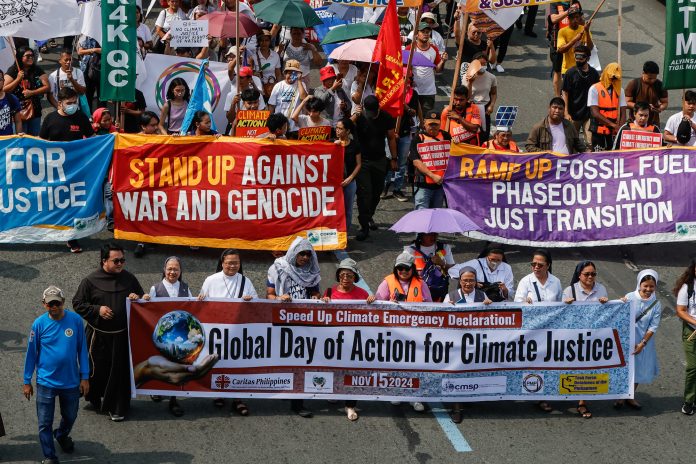Climate advocates from across the Philippines gathered to call on world leaders attending the Climate Summit in Baku, Azerbaijan, for decisive and immediate action to halt global warming and prevent surpassing the critical 1.5°C threshold.
“The Philippines, as one of the countries most vulnerable to the impacts of the climate crisis, plays a crucial role in these climate talks,” said Ian Rivera, National Coordinator of the Philippine Movement for Climate Justice (PMCJ).
From the devastation of Yolanda to Odette and now Kristine, Rivera said the country is an alarming “reminder for developed countries to adhere to their historical responsibility and provide higher climate finance.”
“This is essential to address mitigation, adaptation needs, losses, and damages, just transition and to facilitate a rapid phase-out of coal and fossil fuels while ensuring a just transition to renewable energy,” he added.
Communities across Luzon, Visayas, and Mindanao organized localized actions to highlight the harms caused by fossil fuels and to demand the declaration of climate emergencies in their regions, according to PMCJ.
“The recent coal spill in Masinloc is just one of the many incidents that Zambales communities experience with the coal-fired power plant in their area,” said Erwin Puhawan, PMCJ Luzon Coordinator.
“Their decades-long struggle happens as other areas in Luzon such as Bataan, Batangas, and other provinces invigorate each other voices fighting for the same cause: End fossil fuels, hold the perpetrators accountable; and push for clean energy,” he added.
In the Visayas, activists expressed alarm over the detrimental impact of eight coal-fired power plants in Toledo City, Cebu. Residents in the area have reported ongoing hardships linked to these facilities, prompting them to take action.
In September, they submitted a petition to AboitizPower and Therma Visayas Inc., the corporations operating the plants, urging compliance with legal requirements, including conducting essential health assessments for the project to address the risks to their lives and livelihoods.









